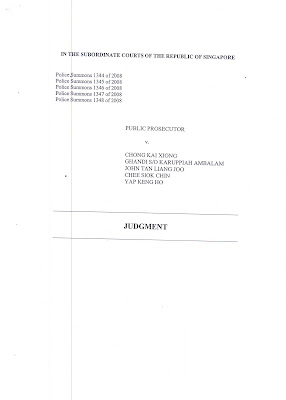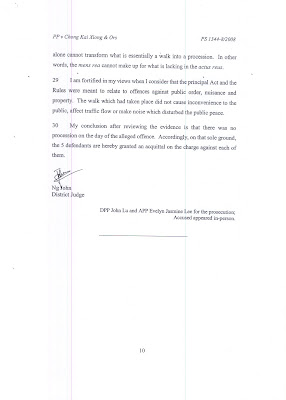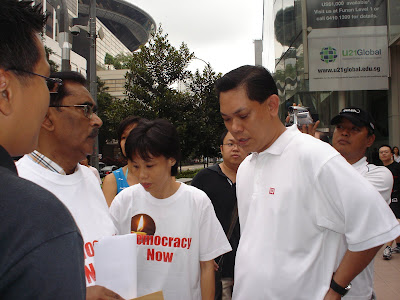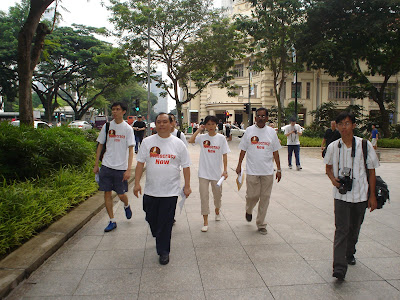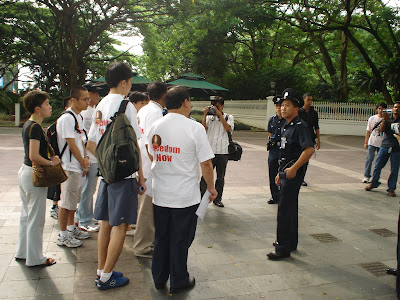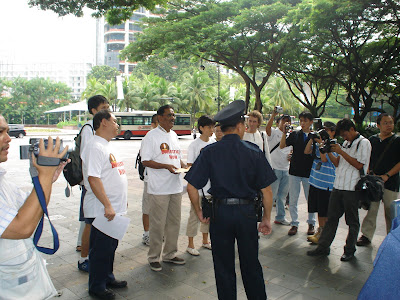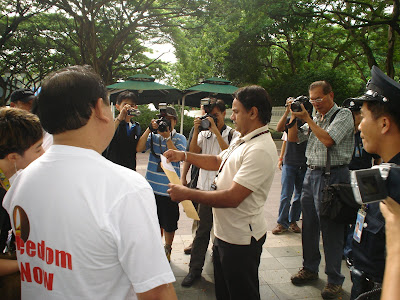- Joined
- Aug 10, 2008
- Messages
- 4,289
- Points
- 0
In a stunning decision, District Judge John Ng acquitted leaders of the Singapore Democrats who were charged with taking part in a procession on 16 Sep 07. Judge Ng said that the walk “did not cause inconvenience to the public, affect traffic flow or make noise which disturbed the public peace.”
Mr Gandhi Ambalam, Mr John Tan, Ms Chee Siok Chin, Mr Charles Tan and Mr Chong Kai Xiong, a human rights activist, were marking the first anniversary of the World Bank-International Monetary Fund (WB-IMF) protest that was held on the same date the year before. Mr Charles Tan is away and was not part of the hearing.
The five who were wearing T-shirts with the words 'Democracy Now' and 'Freedom Now' with a picture of a lighted candle, had walked from the Speakers' Corner along North Bridge Road to Parliament House and then along Bras Basah Road to the Istana and then along Orchard Road to the Queenstown Remand Prison on 16 Sep 07.
They were also conducting a vigil for Dr Chee Soon Juan who was in prison at that time for speaking in public.
The group was charged with conducting a procession without a permit under Rule 5 of the Miscellaneous Offences (Public Orcder & Nuisance)(assemblies & Processions) Rules.
Judge Ng wrote in his judgment that in the absence of the definition of what constituted a “procession” under the law, it was important to consider the “natural and ordinary” meaning of the word.
Citing definitions in the Oxford and Collins English dictionaries, the Judge said that he could not accept the Prosecution's “simplistic” interpretation that “so long as a group of 5 or more people walk[ing] from one point to another point in a public place to commemorate an event” constitutes a procession.
He noted that the group had walked mainly on the pedestrian pathways, using the pavements and sidewalks. They had walked casually and stops were made for pamphlet distribution and toilet breaks.
He concluded: "I am fortified in my views when I consider that the principal [Miscellaneous Offences] Act and the Rules were meant to relate to offences against public order, nuisance and property. The walk which had taken place did not impede or cause any disruption to the flow of vehicular traffic or the movement of pedestrians."
The defendants maintain that taking part in processions and assemblies in Singapore is part of the fundamental rights of citizens provided for in the Constitution as well as the Universal Declaration of Human Rights.
It is unclear if the Deputy Public Prosecutor Mr John Liu will appeal the decision.
Mr Gandhi Ambalam, Mr John Tan, Ms Chee Siok Chin, Mr Charles Tan and Mr Chong Kai Xiong, a human rights activist, were marking the first anniversary of the World Bank-International Monetary Fund (WB-IMF) protest that was held on the same date the year before. Mr Charles Tan is away and was not part of the hearing.
The five who were wearing T-shirts with the words 'Democracy Now' and 'Freedom Now' with a picture of a lighted candle, had walked from the Speakers' Corner along North Bridge Road to Parliament House and then along Bras Basah Road to the Istana and then along Orchard Road to the Queenstown Remand Prison on 16 Sep 07.
They were also conducting a vigil for Dr Chee Soon Juan who was in prison at that time for speaking in public.
The group was charged with conducting a procession without a permit under Rule 5 of the Miscellaneous Offences (Public Orcder & Nuisance)(assemblies & Processions) Rules.
Judge Ng wrote in his judgment that in the absence of the definition of what constituted a “procession” under the law, it was important to consider the “natural and ordinary” meaning of the word.
Citing definitions in the Oxford and Collins English dictionaries, the Judge said that he could not accept the Prosecution's “simplistic” interpretation that “so long as a group of 5 or more people walk[ing] from one point to another point in a public place to commemorate an event” constitutes a procession.
He noted that the group had walked mainly on the pedestrian pathways, using the pavements and sidewalks. They had walked casually and stops were made for pamphlet distribution and toilet breaks.
He concluded: "I am fortified in my views when I consider that the principal [Miscellaneous Offences] Act and the Rules were meant to relate to offences against public order, nuisance and property. The walk which had taken place did not impede or cause any disruption to the flow of vehicular traffic or the movement of pedestrians."
The defendants maintain that taking part in processions and assemblies in Singapore is part of the fundamental rights of citizens provided for in the Constitution as well as the Universal Declaration of Human Rights.
It is unclear if the Deputy Public Prosecutor Mr John Liu will appeal the decision.





